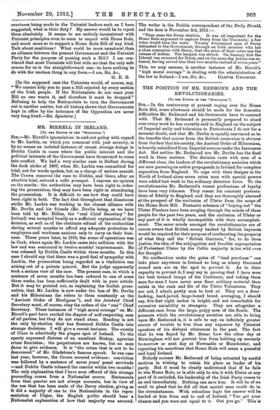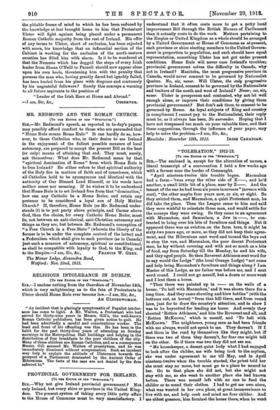THE POSITION OF MR. REDMOND AND THE REVOLUTIONARIES.
[To TEE EDITOR Or THE "SrzeTsToe.••] Sin,—In the controversy at present raging over the Home Rule Bill, some allowance should be made for the domestic difficulties Mr. Redmond and his lieutenants have to contend with. That Mr. Redmond is personally prepared to stand over every word he has recently said in England on the subject of Imperial unity and toleration to Protestants I do not for a moment doubt, and that Mr. Devlin is equally convinced as to the benefits that accrue from the British connexion is obvious from the fact that his society, the Ancient Order• of Hibernians, is heavily subsidized from Imperial sources under the Insurance Act. But neither Mr. Redmond nor Mr. Devlin has the final word in these matters. The decision rests with men of a different class, the leaders of the revolutionary societies which are now pursuing an active propaganda in Ireland for complete separation from England. To cope with their designs in the North of Ireland alone seven extra men with special powers were added last week to the ordinary detective force. To the revolutionaries Mr. Redmond's recent professions of loyalty have been very irksome. They resent his constant protesta- tions of fidelity to England, and they are thoroughly alarmed at the prospect of the exclusion of Ulster from the scope of the Home Rule Bill. Fantastic schemes of "buying out" the Ulster Planters have been surging through the minds of these people for the past two years, and the exclusion of Ulster or any part of it is wholly incompatible with their accomplish- ment. The saner minds amongst the revolutionaries are of course aware that British money backed by British bayonets would be required for their purpose of confiscating the property of what they call the " British Garrison," for, to do them justice, the idea of the subjugation and forcible expropriation of Protestant Ulster by the Celtic majority is too wild even for thought.
No confiscation under the guise of "land purchase " can take place anywhere in Ireland so long as ninety thousand armed men are on the spot to prevent it. As to their capacity to prevent it, I may say in passing that I have seen the best trained troops of the Continent, and taking them man for• man I have never seen finer military material than exists in the rank and file of the Ulster• Volunteers. They are not, I admit, pretty men to look at. They are a dour- looking, hard-jawed, large-boned breed, averaging, I should say, five feet eight inches in height, and not remarkable for excessive amiability to strangers. They are altogether a different race from the large, pulpy men of the South. The pressure which the revolutionary societies are able to bring upon Mr. Redmond is, it is safe to say, an infinitely greater source of trouble to him than any exposure by Unionist speakers of his disloyal utterances in the past. The fact that be was flayed by Mr. Boner Law the other day at Birmingham will not prevent him from bobbing up serenely to-morrow or next day at Newcastle or Manchester, and repeating his assertions that Home Rule will mean a peaceful and loyal Ireland.
Nobody accuses Mr. Redmond of being actuated by sordid motives in wishing to retain his place as leader of his party. But it must be clearly understood that if he fails to win Home Rule, or is able only to win it with Ulster or any part of it excluded, his leadership of the Irish Party comes to an end immediately. Nothing can save him. It will be of no avail to plead that be did all that mortal man could do in the circumstances. With relentless logic the answer will be hurled at him from end to end of Ireland, " You got your chance and you were not equal to it. Out you go." This is
the pitiable frame of mind to which he has been reduced by the knowledge at last brought home to him that Protestant Ulster will fight against being placed under a permanent Roman Catholic majority from the rest of Ireland. His offer of any terms to Ulster, short of exclusion, has been rejected with scorn, his knowledge that an influential section of the Cabinet is working for the exclusion of the north-eastern counties has filled him with alarm. Is it to be wondered at that the Nemesis which has dogged the steps of every Irish leader from Shane O'Neill to Parnell should now appear close upon his own heels, threatening him with the penalty that pursues the man who, having greatly dared but ignobly failed, has been hurled from his place with disgrace and contumely by his ungrateful followers ? Surely this conveys a warning to all future aspirants to the position of "Leader of the Irish Race at Home and Abroad."



















































 Previous page
Previous page